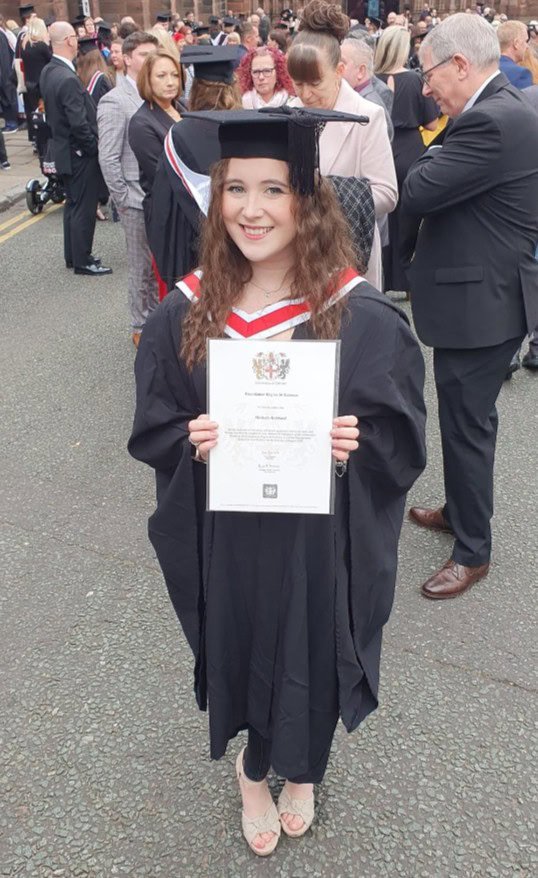After trading an art and design course for at , she’s graduated from University Centre Reaseheath with a BSc (Hons) in Animal Management (Behaviour and Welfare), a research presentation under her belt, and a renewed confidence in herself.
Although she celebrated graduation day from afar – attending her aunt’s wedding in Australia while her classmates crossed the platform at Chester Cathedral on November 6th – Michelle says she feels ‘incredibly proud’ to be part of Reaseheath’s Class of 2025.
“I’ve always loved animals, especially mammals,” explains the 22-year-old from Orford in Warrington. “But for a long time, I didn’t know what to do with that love.”
After leaving Beamont Collegiate Academy, Michelle began studying art and design at college. “I loved it,” she explains, “but when lockdown hit, I found myself becoming really disinterested and bored with it. So, I decided to research careers with animals instead. I’ve always had a passion for taking care of them, especially the ones I could interact with.”
She switched to a science qualification so she could apply for animal-based degrees and achieved D*D*D grades before deciding on her next move.
“I’d received a few offers for universities,” Michelle recalls. “I went to one open day first because of its national ranking, but when I came to Reaseheath, it just felt right. The campus was all greenery and calm, with a mini zoo right there on site. My mum said, ‘This is where you’ll be in your element,’ and she was right. I didn’t even view anywhere else after that.”
Michelle went on to complete her degree with a 2:1, producing a dissertation on the enclosure use of short-clawed otters at Reaseheath Zoo.
“Animal behaviour has always interested me most out of all the aspects of my course,” she says. “To me, it feels like understanding their behaviour is the best way to connect with them.”
When choosing her topic, Michelle deliberately picked something that hadn’t been over-studied. “The otters weren’t a species that already had a lot of published research. I suppose you could say I always try to be different – attempt things that have either not been done or have rarely been done. But honestly, it was difficult, trying to compare my research to others’ because there wasn’t a great deal out there.”
Michelle’s research revealed the otters’ tight-knit nature. “What was surprising was that I rarely saw them apart,” she says. “They’re very sociable animals and have to be kept in groups. I thought I’d see more individual movements and personalities, but they were always together, joined at the hip.”
Michelle later presented her findings at the BIAZA Research Conference, which she describes as a real turning point.
“When BIAZA accepted my research, I honestly felt like I was finally getting somewhere. I don’t do the work for appreciation – I do it because it’s what I love. But just the fact that someone actually liked and was interested in what I did was amazing.”
It also helped her discover a new passion. “It turns out I do actually enjoy researching and investigating,” she says.
Her final year, though, was anything but easy. Michelle faced personal loss while juggling her studies, including the passing of her grandmother and her dog, both of which hit hard.

“It really was one of the toughest times of my life,” she says. “All of the lecturers and students who knew me knew I was a huge stress head, so I just learned to take it how it comes, one thing at a time. The next thing can be dealt with later. Literally a ‘cross that bridge when you come to it’ situation.”
Through it all, Michelle kept going. “No one ever stays motivated 24/7,” she says. “Life will get you down, but honestly, when I watched documentaries or videos of the career I could be doing in the future, that kept me going. Not just that – I always made time for myself, my friends, my family, and work. Having that balanced life instead of always making it about work makes it so much easier to do your best.”
Her advice for future Reaseheath students is simple and heartfelt. “Make friends,” she says. “During my first year, I was in Platt Hall and I made every effort to make friends. We all ended up being a huge family. I can be quite an anxious person at times, and I do find it hard to speak to new people. But just a simple ‘hi’ will make you a friend for life. Friends make it all worthwhile. Your degree shouldn’t be solely about education and work – an important part is making it interesting and fun.”
Michelle is now exploring roles in zookeeping and animal behaviour research, and would love to join Chester Zoo in the future. The research field may be competitive, but she’s not deterred.
“The research side of animal behaviour is difficult to get into,” she says. “But I’m determined. I’m hoping someone will see how hard I’ve worked and give me a chance to be part of their team.”
Visit our blog listings page or view our latest blogs below.
Animal Behaviour